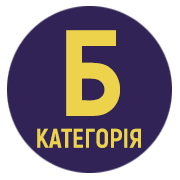STRUCTURAL FEATURES OF THE FORMATION OF ENSEMBLE SINGING SKILLS OF STUDENTS OF ART FACULTIES IN THE PROCESS OF PROFESSIONAL TRAINING
Abstract
The article reveals the structural features of the formation of ensemble singing skills of future teachers of musical art in the process of professional training. The cognitive-orientational, competence-projective and activity-creative components are distinguished in the structure of ensemble singing skills of future teachers of musical art. The cognitive-orientational component in vocal training ensures the formation of a conscious approach of future teachers of musical art to vocal training, the development of their musical- aesthetic thinking, skills and abilities in the field of vocal art. This component is characterized by a conscious approach of students of the faculties of arts to the process of vocal training. The competenceprojective component forms the professional development of a future specialist for the realization of their own abilities, talents and opportunities in the profession. An essential feature of the competence-projective component in modern art education is the entry into the values of modern life, the ability to self-realization, the development of artistic competence and consciousness, the need for spiritual, creative and personal improvement in the process of artistic cognition. The activity-creative component reflects the student's ability to express himself, generate musical and performing ideas and implement them in creative projects. It covers those aspects of vocal training that contribute to the realization of future teachers of musical art of their creative abilities through practical activities, such as: creative self-realization, development of improvisational skills, creation of one's own repertoire, stage creativity, etc.
References
Гончаренко, С. У. (2008), Педагогічні дослідження: методичні поради молодим науковцям. Київ-Вінниця: ДОВ «Вінниця». 278 с.
Доній, В.М., Несен, Г.М., Сохань, Л.В., Єрмаков, І.Г. та ін. (1996), Психологія і педагогіка життєтворчості: навч.-методичний посібник ред. рада. Київ. 792с.
Зязюн, І.А., Крамушенко, Л.В., Кривонос, І. Ф. (1997), Педагогічна майстерність. Підручник. К.: Вища школа. 349 с.
Олексюк, О. М., Ткач, М. М. (2004). Педагогіка духовного потенціалу особистості: сфера музичного мистецтва : навчальний посібник. Київ : Знання України. 264 с.
Падалка, Г. М. (2008). Педагогіка мистецтв (Теорія і методика викладання мистецьких дисциплін). Київ : Освіта України, 274 с.
Пєхота, О. М., Кіктенко, А. З., Любарська, О. М. (2001). Освітні технології : навчально-методичний посібник. Київ : А.С.К. 256 с.
Рибалко, В. В. (2016). Словник із психології та педагогіки обдарованості і таланту особистості: термінологічний словник. Київ, Житомир: Вид-во ЖДУ ім. І. Франка. 424 с.
Рудницька, О.П. (2010). Мистецька освіта в Україні: теорія і практика. заг. ред. О. В. Михайличенко, ред. Г. Ю. Ніколаї. Суми: СумДПУ ім. А. С. Макаренка. 255 с.
Столяренко, О. Б. (2012). Психологія особистості. Навч. посіб. Київ: Центр учбової літератури. 280 с.
Шахов, В. І. (1992). Системний аналіз структури педагогічного мислення. Проблеми розвитку психолого-педагогічної науки в науково-технічній творчості молоді. Збірник статей. Київ С. 37–40.
Tkachenko, T., Yeremenko, O., Kozyr, A., Mishchanchuk, V., Liming, W. (2022). Integration Aspect of Training Teachers of Art Disciplines in Pedagogical Universities. Journal of Higher Education Theory and Practice. Vol. 22(6). Р. 138–147.
Tkach, M., Kozyr, A., Mymryk, M., Dubiuk, N., Liming, W. (2023). General problems of higher music education, Ways of modernizing education and improving the research skills of young people, Youth Voice Journal, Vol. II, 2023, pp. 59–70. https://doi.org/10.13140/RG.2.2.18140.97925
Tkach, M., Oleksiuk, O., Bobyk, L., Mymryk, M., Liming, W. (2024). Non-linear thinking strategies in post-nonclassical higher art education: A synergistic concept. Sci Herald Uzhhorod Univ Ser Phys. 2024, (55), 1994–2005. https://doi.org/10.54919/physics/55.2024.199kv4





